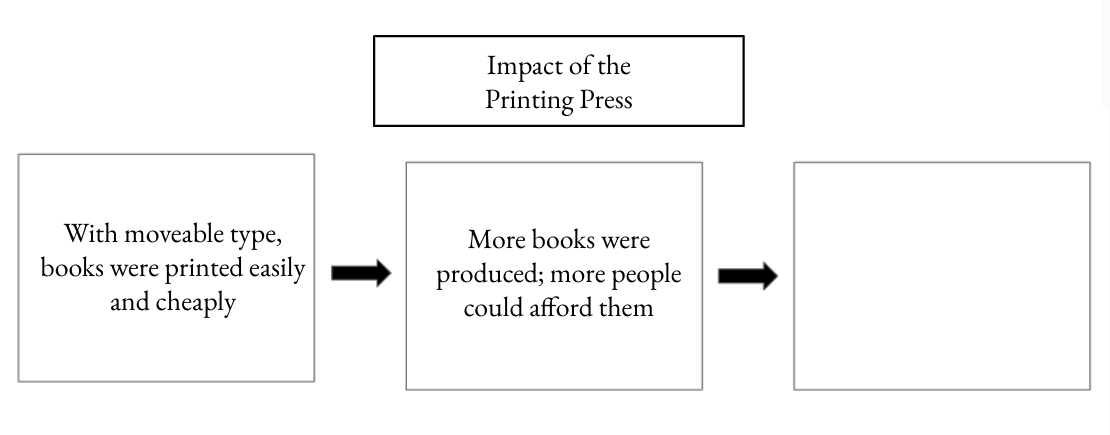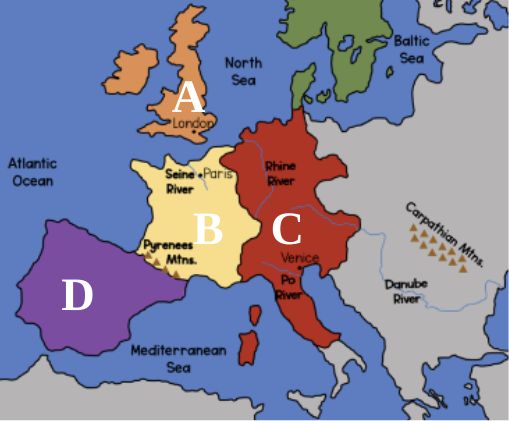Which reform occurred during King John's rule in England?
a. Magna Carta
b. Parliament
c. Common law
a. Asia
b. Australia
c. the Muslim world
d. Europe
b. Australia
As the feudal system declined in the late medieval period, centralized governments began to form in Europe. This led to the rise of:
a. city-states
b. nation-states
c. enclaves
d. unincorporated territories
b. nation-states

Who created The Last Supper?
a. Judas
b. Albrecht Durer
c. Leonardo da Vinci
d. Raphael
c. Leonardo da Vinci
A nation-state is a state in which citizens share:
a. Common language
b. Common climate
c. Common descent
d. Common religion
c. Common descent
Charles V was the ruler of which nation-state?
a. England
b. Spain
c. Russia
d. France
b. Spain
The artistic center of the Northern Renaissance was:
a. Fulton
b. Florence
c. Paris
d. Flanders
What was the significance of the Renaissance?
a. It was a distraction from the suffering of the Black Death and the Hundred Years' War
b. It was a school of thought that emphasized death and the afterlife
c. It represented a rebirth of interest in learning, art, and science
d. It reinforced the authority of the Catholic Church
c. It represented a rebirth of interest in learning, art, and science

Who created the statue of David?
a. Donatello
b. Leonardo da Vinci
c. Michelangelo
d. George
c. Michelangelo
What does secular mean?
a. religious
b. realistic
c. non-religious
d. food-related
c. non-religious
After the fall of Charlemagne's Holy Roman Empire, which rulers united most of France?
a. the Ming Dynasty
b. the Capetian Dynasty
c. the Kennedy Dynasty
d. the Carolingian Dynasty
b. the Capetian Dynasty
Where did the Italian Renaissance first begin?
a. Rome
b. Venice
c. Flanders
d. Florence
d. Florence
What is the significance of the Magna Carta?
a. Limited the power of the king and guaranteed basic political rights
b. Expanded the Spanish Empire in the Western Hemisphere
c. Judges' rulings on cases became precedent for later laws
d. Created the English legislative branch
a. Limited the power of the king and guaranteed basic political rights
____________ provided the economic foundation of the Renaissance.
a. Wealthy patrons
b. the Church
c. inheritance from the French
d. Taxes from farmers
a. Wealthy patrons
Northern writers who criticized the Church and focused on ways to reform society were known as:
a. Naturalists
b. Christian humanists
c. Herbalists
d. Realists
b. Christian humanists
Which Catholic monarchs(s) expelled Jews and Moors from Spain in the 15th century?
a. Phillip II
b. William & Mary
c. Charles V
d. Ferdinand & Isabella
d. Ferdinand & Isabella
Who fought in the Hundred Years' War?
a. France and Spain
b. England and Spain
c. France and Germany
d. England and France
d. England and France

Complete the diagram.
a. Literacy rose and ideas spread
b. There was a paper shortage
c. The Bible was the only book that people read
d. Scribes lost their jobs
a. Literacy rose and ideas spread
a. Petrarch
b. Michelangelo
c. Machiavelli
d. Nostradamus
c. Machiavelli
Why is 1500s England referred to as the Elizabethan Age?
a. Queen Elizabeth II raised many corgis
b. Queen Elizabeth I's patronage of the English Renaissance
c. Queen Elizabeth II was the longest-reigning monarch
d. Queen Elizabeth I never married
b. Queen Elizabeth I's patronage of the English Renaissance
Which of the following is NOT an accomplishment of Ivan the Great?
a. Defeated the Mongols
b. Centralized power in Moscow
c. Formed the Soviet Union
d. Expanded the Russian nation
c. Formed the Soviet Union

Which nation-state did William the Conqueror unite through the Norman Conquest?
A - England
Joan of Arc was the 17-year-old peasant girl who led French armies to victory over England during the _________________.
a. Hundred Years' War
b. Persian War
c. French Revolution
d. American Revolution
a. Hundred Years' War
Who was responsible for making improvements to the printing press?
a. William Shakespeare
b. Sir Thomas More
c. Johannes Gutenberg
d. Harper Collins
c. Johannes Gutenberg
After the end of the Hundred Years' War, what emerged in England and France?
a. Nationalism
b. Tyranny
c. Feminism
d. Hinduism
a. Nationalism